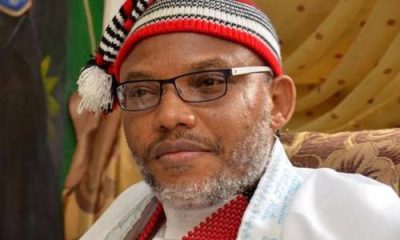Foreign News
NiDCOM Boss Visits Family of Nigerian killed in Canada

Mrs Abike Dabiri-Erewa, Chairman and Chief Executive Officer, Nigerians in Diaspora Commission (NiDCOM), has paid a condolence visit to the bereaved family of Mr Chibueze Momah.
Momah and Tosin Amos-Arowoshegbe were killed at a club in Canada on July 23,2022.
This is contained in a statement by NiDCOM’s Media, Public Relations and Protocols Officer, Mr Gabriel Odu on Monday in Abuja.
Dabiri-Erewa paid the visit at the deceased residence in Lagos, to convey her deepest sympathy and support for the family.
She prayed to the Almighty God to give the family the strength to bear the irreparable loss of their son who recently graduated in Computer programming few months before his untimely death.
The father, Mr Ikechukwu Momah, on behalf of the family thanked the NiDCOM boss and her team for the visit and pleaded for a thorough investigation into the matter.
Both victims worked at the ATL lounge in Vaughn, Ontario as security guards.
The killers were said to have fled the scene of the incident after shooting them before the police arrived. www.nannews.ng (NAN)
Foreign News
Kenya Court Convicts 4 Ant Traffickers, Fines Each $7,700

A Kenyan court on Wednesday fined four men 7,700 dollars each for attempting to traffic thousands of ants out of the country.Wildlife experts said that this signals a shift in biopiracy from iconic animals like elephants to lesser-known species.Authorities arrested two Belgian teenagers, a Vietnamese man and a Kenyan national on April 5, accusing them of trying to smuggle roughly 5,440 giant African harvester ant queens.
Kenyan prosecutors valued 5,440 ants at around 1. 2 million Kenyan shillings ($9,300).However, retail prices in the UK suggest the haul may have fetched as much as one million dollars if it had reached European shores.Ant keepers in Europe maintain colonies in large transparent vessels known as formicariums to observe their cooperative behaviour.Magistrate Njeri Thuku ordered the traffickers, who all pleaded guilty, to pay the fine or face 12 months in jail. (Reuters/NAN)Foreign News
Israeli Drone Attack Kills Hamas Official in Southern Lebanon

The Israeli military said it had killed a Hamas commander in southern Lebanon in a drone attack on Wednesday.
“The IDF struck an area in Sidon and eliminated the terrorist Khalid Ahmad Ahmad, who served as the head of operations in Hamas’ Western Brigade in Lebanon,’’ the military said.
It added that the targeted Hamas operative had smuggled weapons and carried out terrorist attacks against Israel.
Hamas had confirmed the attack, saying it was mourning Ahmad, who it described as a lead engineer.
It said he was killed while on his way to perform the dawn prayer in the coastal city of Sidon, 40 kilometres south of the capital Beirut.
Since late November, a fragile ceasefire has been in place between Israel and Hezbollah, the Hamas-allied militia in Lebanon, but both sides accuse each other of violations.
In spite of the ceasefire, Israel reserves the right to continue attacking militia targets in Lebanon. (dpa/NAN)

WHO Decries 33-year Life Expectancy Gap Between Rich, Poor Countries
The World Health Organization (WHO) says on Tuesday that more than 30-year difference in life expectancy between the richest and the poorest countries highlights global health inequities.
The global health body stated this in its ‘World Report on Social Determinants of Health Equity’ launched on Tuesday by its Director-General, Dr Tedros Ghebreyesus.
The report revealed that where one was born could be the difference between living over three decades longer than someone else from a poorer country lacking safe housing, good educational opportunities and access to decent jobs.
According to the report, people in the country with the highest life expectancy will, on average, live for 33 years more than those born in the country with the lowest life expectancy.
It further revealed that lack of safe housing, good educational opportunities and access to decent jobs could be responsible for a reduction in life expectancy in both rich and poor countries alike.
“Our world is an unequal one. Where we are born, grow, live, work and age significantly influences our health and well-being,” said Ghebreyesus.
The report found that inequities in health were closely linked to degrees of social disadvantage and levels of discrimination.
“Health follows a social gradient whereby the more deprived the area in which people live, the lower their incomes are,” the UN global health agency said.
It stated that inequities’ were exacerbated in populations that face discrimination and marginalisation, such as Indigenous Peoples, who had lower life expectancies than their non-Indigenous counterparts.
According to the report, this is the case in both high and low-income countries.
The study was the first to be published since 2008 when the WHO Commission on Social Determinants of Health released its final report.
The report laid out targets for 2040 for reducing gaps between and within countries in life expectancy, childhood and maternal mortality.
It showed that these targets were likely to be missed and in spite of a scarcity of data, there was sufficient evidence to show that health inequities were often widening.
“For example, children born in poorer countries are 13 times more likely to die before their fifth birthday than in wealthier countries.
“Moreover, modelling shows that the lives of nearly two million children annually could be saved by closing the gap and enhancing equity between the poorest and wealthiest sectors of the population within low- and-middle-income countries.”
Additionally, while maternal mortality declined by 40 per cent between the years 2000 and 2023, the majority of deaths, 94 per cent, still occurred in low and lower-middle-income countries.
WHO called for collective action to address economic inequality and invest in social infrastructure and universal public services.
The agency also recommended other steps, including overcoming structural discrimination and the determinants and impacts of conflicts, emergencies and forced migration




















